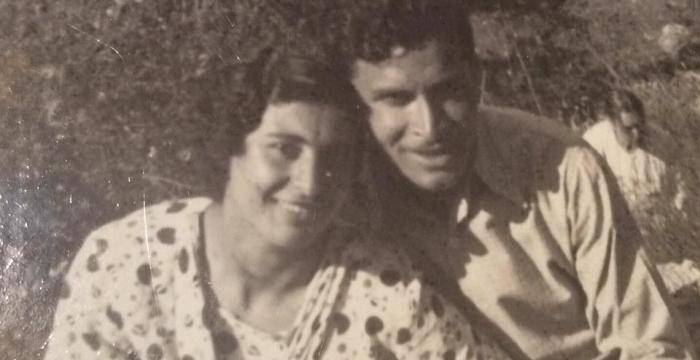
The Story of a Woman and a Nation
The Story of a Woman and a Nation

On the first floor of Bethlehem Bible College’s new building is a gift shop; a place filled with gorgeous Palestinian handicrafts, jewelry and interesting books relevant to the topic of Palestinian Christians. Among these you will find a unique book titled “Palestinian Memories, the Story of a Palestinian Woman and her People.” The book was written by Rev. Alex Awad, who was the pastor of the Baptist Church in Jerusalem and the Dean of Student Affairs at Bethlehem Bible College.
The Early Days of Huda Awad
The story revolves around Alex’s mother, “Huda” whose name means “guidance,” and who passed through many difficult conditions in Palestine.Huda was born in Jerusalem in 1916. Her parents were religious and were part of the Orthodox Church. Huda’s father, Mousa, died in 1927 when she was only 7 years old.
After the First World War, the Palestinian people went through very difficult living conditions; nevertheless, Christian families including Huda’s family found hope and solace in their faith. It appears that Grandma Rihanna had a profound effect on Huda and her brothers, George and Qustandi. Rihanna and her grandchildren had a special love affair and she spent many hours playing with them and giving them special love and attention.
One day, Rihanna gathered about 10 children from the neighborhood in the central square between the houses and offered them some candy and tea with biscuits, and asked them to sing some hymns that they learned in church.
Huda lived without a father, but her house was full of love and happiness. Her mother Nathira worked in the American Colony Hotel, ironing clothes and bed sheets. Although the family was poor and did not have much, its members learned to rely on the Lord and the boys memorized the Ten Commandments and the teachings of the Lord Jesus.
One day Nathira asked Huda to go to the store to fetch some items such as rice and sugar. However, Abu Ali, the owner of the store, refused to give her anything because the family’s debt had increased greatly. Huda’s mom reached out to the Lord and He responded to her prayer. Abu Ali changed his mind and decided to help the struggling family, giving them everything they needed.
Huda’s Adulthood
After the death of her father, Huda and her siblings were sent to a school for orphans in Jerusalem, which was affiliated with the Church of God. In 1932, a major change took place in Huda’s life. In this school, at the age of 16, Huda accepted Jesus Christ as her savior. Two years later, after graduating, she joined the School of Nursing. In 1937 Huda married Elias Awad and in the following years had 8 children, one of whom died after birth. Elias worked at Beit Safafa Hospital while Huda took care of their children.
War and Loss
In 1948—the year of war, the year of the Nakba, the year of displacement and suffering of most Palestinians—Huda’s family suffered like all the others. Caught between warring forces, they were unable to leave their house for weeks at a time as much fighting was centered around their neighborhood. When it suddenly got quiet, Huda’s husband decided to venture carefully outside to inspect the situation and look for food for his family. However, the moment he set foot outside the house, the family heard gunshots and Elias was found on the ground with a bullet in his head. Just weeks after his burial, the Jordanian army invaded the neighborhood. They were convinced that its inhabitants were Jews and not Arabs; hence, the commander ordered the killing of everyone. Huda went to the commander and told him, isn’t there a verse in the Quran that prohibits the killing of widows and children? She then quoted the whole verse from the Quran. Through her courage and quick thinking, Huda rescued not only her family but also the whole neighborhood from death.
After a brief period of quiet, Jordanian soldiers returned in the middle of the night and told everyone in the neighborhood that they would have to leave their homes because the Israeli army was advancing towards the neighborhood. There was no time to take anything from the house. They closed the doors and they left on foot until they reached the Old City of Jerusalem. This was the last day they saw their own home. They would never live in it again. Huda and her children became one more family of refugees, amidst 780,000 other Palestinian refugees.
Huda’s Triumph
In such moments, I wonder how Huda might have felt: in a very short time she had witnessed her husband’s death and the displacement of her family. Despite these difficult situations, Huda did not lose her faith and her love for the Lord and for her seven children. She put her children in various schools for orphans, such as the Arab Child House for Girls and the Boys House, while still managing to the keep the family together. During the day, she worked as a nurse in Jerusalem, and at night she was studied to become an official nurse. She worked in several hospitals including Alhospec in Jerusalem, Irbid in Jordan and Ramallah hospital. Eventually, she was appointed director of a hospital in Hebron and of the governmental hospital in Beit Jala.
In many cases, the Lord uses such trials to help us grow in faith and this was certainly the case with Huda, whose life was marked with faith and love for her children and for the service of people. No matter where she lived, she would gather young children together and teach them Bible stories. She also led Bible studies for women and encouraged them to rely on the Lord and to develop their faith.
Huda’s Legacy
Her life touched many people, but her greatest legacy is her own children, who have learned how to live with faith and dependency on God more than people. Her son, Rev. Alex writes:
“My passion is to come back to my dear country and to serve in it. I am inspired by the great faith and courage of my mother. I never saw my mother in any day without a smile on her face.”
Huda’s faith-filled smile defied all odds.
I never heard my mother complaining or blaming God for what happened to us. I never heard her wondering, “Why, O God?” She always used to tell us not to look back but forward, to a better future.We never saw any hatred or revenge in her, but she taught us to forgive and forget. Her impact on us children was very positive.
The result of her faith, love and tolerance can now be seen yielding a harvest in her seven children. By God’s grace, all of them are successful in their lives, and their faith and their positive influence is see by all.
Take for example Rev. Alex Awad, who became a pastor, a teacher and an example of holiness and love for all people. The Lord used him to spread the Gospel and an unshakable faith in Christ. Our brother Mubarak, on the other hand, was used by the Lord to resolve disputes and teach non-violence in a society full of violence and murder. And now, he is senior lecturer in the largest American universities.The Lord also chose me, Bishara, to found Bethlehem Bible College, which trains Palestinian leaders and servants to spread the word of life in their communities.
Huda’s effect was not only on her children, but the Lord used her to bless Palestinian society as a nurse, a mother and a midwife. She was known for her compassion and for helping many mothers free of charge.
There is no doubt that she is now in the arms of the Lord Jesus: “…a woman who fears the LORD is to be praised” (Proverbs 31: 30).
You can order the book here: https://goo.gl/gk30DD
by Bishara Awad. This article was originally written for and printed in BBC’s woman’s magazine, “A Pot in His Hands.”
Amira is the Communications Coordinator of Bethlehem Bible College. She is a committed Palestinian Christian who has a passion for writing about the intersection of faith and seeking justice for her fellow countrymen. To read more of her writings sign up for Bethlehem Bible College’s monthly newsletter.

